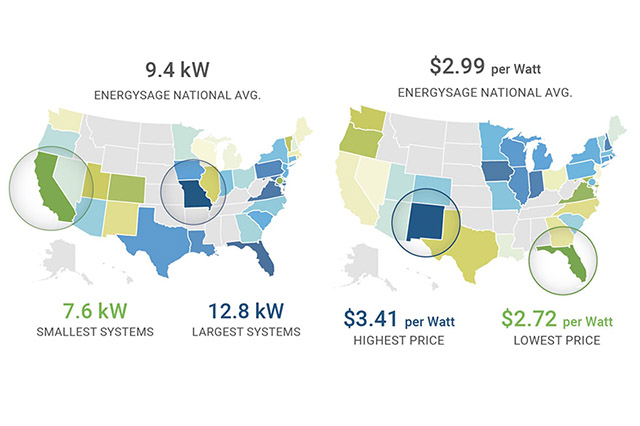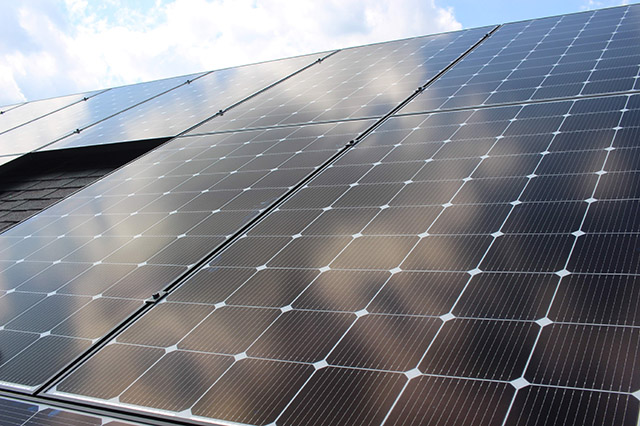Everywhere you look, more and more people are installing solar panels on their homes and properties. In fact, over 2 million households have already installed solar in the U.S., including large numbers of installations in the Northeast, where high electricity prices and strong solar policies make solar a great investment.
How much you can personally save with solar depends on a number of things, but the most important factor is how much you currently pay for electricity.
How much can you save with solar?
The primary financial benefit of solar energy is that it allows you to avoid paying most or all of your monthly electricity bill. While individual monthly electricity bills may not be overwhelming, they can add up over 20 or 25 years. Consider this: If your monthly electricity bill is $150, over the next 25 years, you’ll pay almost $60,000 in electricity bills, and if your current bills are $250, that’s nearly $100,000 over the next 25 years.
| Current monthly bill | $100 | $150 | $200 | $250 |
| 10-year spending | $13,000 | $20,000 | $26,000 | $33,000 |
| 15-year spending | $21,000 | $31,000 | $42,000 | $52,000 |
| 20-year spending | $29,000 | $44,000 | $58,000 | $73,000 |
| 25-year spending | $38,000 | $58,000 | $77,000 | $96,000 |
Asssuming 2% annual utility rate escalation and similar annual usage.
In leading solar states, solar homeowners tend to offset 95 percent or more of their electricity needs with solar. This means that over the course of the 25 or even 30 years that your solar energy system produces electricity, you can save tens of thousands of dollars by going solar.
How much does solar cost?
How much you pay for solar depends primarily on two things: where in the country you live, and how much solar energy you’ll need to power your home. In the Northeast, solar costs are generally higher than elsewhere in the country, meaning you’re likely to pay more for every solar panel you install in New England than in the Southeast, for instance.

However, New Englanders use less electricity than people in other regions, meaning you may need a smaller solar energy system in the Northeast than elsewhere in the country to offset your entire electricity bill. For a 9 kilowatt (9,000 watt) solar panel system at a regional average price of $3.20 per watt, purchasing a solar energy system would cost $29,000.
But the upfront cost isn’t the whole story. Rather, if you install solar in 2020, you’re eligible to receive a tax credit equal to 26 percent of your solar investment; for the solar energy system described above, that would be a $7,500 credit off of your taxes. And other states in the region provide additional rebates and incentives, such as the $1,000 tax credit in Massachusetts, which can help reduce the upfront cost of solar even further.
How long does it take for solar to pay for itself?
The payback period for solar is a product of how much you spend on electricity, how much you spend for a solar panels system, and what rebates and incentives are available to you. Nationally, a solar panel system will pay for itself in eight years on average, according to EnergySage data. In the Northeast, homeowners in Connecticut, Massachusetts, New York and Rhode Island see payback periods below this average, even down to five years or less if the circumstances are right.
| State | $/W | Payback period |
| CT | $3.23 | 7.4 |
| MA | $3.16 | 5.9 |
| ME | $3.05 | 10.8 |
| NH | $3.29 | 9.3 |
| NY | $3.21 | 7.9 |
| RI | $3.31 | 7 |
| VT | $3.14 | 9.7 |
There are a number of tools that provide a window into how much you could potentially save with solar. One such resource is EnergySage’s online Solar Calculator, which uses satellite data to gauge how much sunlight your roof receives and to estimate how much solar you would need to install in order to offset your current electricity bills.
Now that you know the financial benefits of solar, would you consider converting? Have you already? Tell us in the comments.
Learn more about if solar power is right for you and your home. Before you start installing panels, talk to an insurance agent to see how you’ll be covered.
2 Thoughts on “The Financial Benefits of Solar”
Leave A Comment
Comments are subject to moderation and may or may not be published at the editor’s discretion. Only comments that are relevant to the article and add value to the Your AAA community will be considered. Comments may be edited for clarity and length.


















Your article doesn’t say anything about “How old is your roof” and should I redo it before solar panels get put on it?
I save an average of 60-70 dollars a month on electricity by having my solar panels